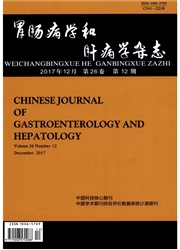

 中文摘要:
中文摘要:
轻微肝性脑病(minimal hepatic encephalopathy,MHE)是并发于各种类型的肝硬化及各种门体分流术患者出现认知功能紊乱的表现,其发病机制仍不清楚,目前所公认的是经典的氨中毒学说。由于MHE缺乏典型的临床表现,只能通过神经心理测试和神经生理测试发现,其发病率已上升至30%~84%,MHE可对患者的日常生活造成影响,很可能发展为症状性肝性脑病(OHE),病死率极高,目前有研究表明益生菌可明显改善MHE症状,防止MHE发展为症状性肝性脑病(OHE)。本文就MHE的流行病学调查、发病机制、临床表现、诊断方法和其与益生菌的关系作一综述。
 英文摘要:
英文摘要:
Minimal hepatic encephalopathy(MHE) is a prevalent failure of neurocognitive complication of cirrhosis and patient with portal systemic bypass without intrinsic liver disease.The pathogenesis of MHE remains incompletely elucidated,although a central theme of all current hypotheses is that the accumulation of ammonia,predominantly derived from the intestine,play a crucial role.Clinical manifestations range from coma to subtle cognitive abnormalities detectable only on psychometric or neurophysiologic testing.Minimal hepatic encephalopathy occurs in approximately 30% to 84%,MHE is associated with impaired health-related quality of life,predicts the development of overt HE and is associated with poor survival.We wrote a review about the epidemiology,pathogenesis,clinical manifestation,diagnosis of MHE and the relationship between MHE and probiotics.
 同期刊论文项目
同期刊论文项目
 同项目期刊论文
同项目期刊论文
 期刊信息
期刊信息
